What news this month? The awards season is winding down but we still have a few to go. In October, for example, we had:
- the announcement of the biennial Barbara Jefferis award, and it went to Peggy Frew’s Hope Farm which was shortlisted for a few awards this year and has received several reviews for the challenge.
- the Patrick White Award, which was endowed by White from his Nobel Prize money. It goes to “an author who has made an ongoing contribution to Australian literature, but who may not have received due recognition”. This year’s winner was Carmel Bird, a wonderful writer who has written across the forms including novels, short stories, essays. Four of her books have been reviewed (with 5 reviews) for the challenge this year.
- the announcement of the shortlist for the Prime Minister’s Literary Awards. There are several categories, but here I’ll just name the women shortlisted for the fiction prize: Lisa Gorton’s The life of houses and Charlotte Wood’s The natural way of things. Wood has, as you’ll know if you’ve been reading our blog, been reviewed many times for the challenge, and Gorton’s book was reviewed a couple of times last year, but not at all this year. Interesting, eh?
It’s October again … where has the year gone
We had 22 reviews in October, with the following highlights:
- Two novels were reviewed three times this month: The good people, by Hannah Kent, she of the hugely popular Burial rites, and Between a wolf and a dog, by well-established author, Georgia Blain.
- Our most prolific reviewers were Carol (of the wonderfully named Reading, Writing and Riesling) with three reviews, followed by Emily Paull (The Incredible Rambling Elimy), Jennifer Cameron-Smith, Kate (Booksaremyfavouriteandbest), Kim Forrester (Reading Matters), and me (Whispering Gums) with two each.
The Classics
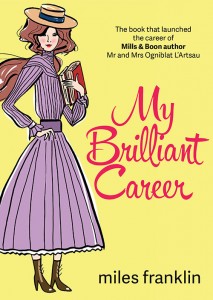 We had one classic reviewed this month, and it’s one of our favourites here, Miles Franklin’s My brilliant career. Our reviewer was Jennifer Cameron-Smith (GoodReads) who had an interesting comment to make about what was a rereading for her:
We had one classic reviewed this month, and it’s one of our favourites here, Miles Franklin’s My brilliant career. Our reviewer was Jennifer Cameron-Smith (GoodReads) who had an interesting comment to make about what was a rereading for her:
I finished this novel resolving to read the rest of Miles Franklin’s works (as well as those she wrote under the pseudonym of ‘Brent of Bin Bin’). This is one of very few novels I’ve read where marriage was not the preferred option for a female. When I first read it (in the 1970s), I took this for granted. Reading it again, I’m more aware of how unusual this was for a novel written in the late nineteenth century.
Do you reread novels and see something new the next time around?
Carmel Bird
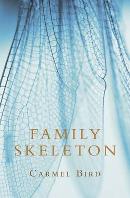 Just one of Bird’s many books was reviewed this month, her latest novel Family skeleton, but given her Patrick White Award, and the fact that she has been reviewed five times this year, I thought I’d feature her this month. To start with, here is what the judges said on choosing her for the award:
Just one of Bird’s many books was reviewed this month, her latest novel Family skeleton, but given her Patrick White Award, and the fact that she has been reviewed five times this year, I thought I’d feature her this month. To start with, here is what the judges said on choosing her for the award:
Carmel has contributed widely and uniquely to Australian literature since her first book in 1976. Carmel has since gone on to publish 30 more books – her imagination is extraordinarily wide-ranging and her fiction consequently creates a world that criss-crosses textual, intellectual and geographical boundaries.
The four books reviewed for the challenge this year demonstrate some of her variety: her latest novel, Family skeleton (2 reviews); two collections of short stories, My hearts are your hearts and The essential bird; and her delightful small essay-cum-memoir, Fair game: A Tasmania memoir. I’ll start with Family skeleton because it was reviewed this month.
It was reviewed by Kylie Mason for The Newtown Review of Books. Mason starts by describing Bird as “one of Australia’s most prolific and original authors”. She liked the work immensely, saying:
As ever, Bird’s writing is lyrical and transporting. She vividly paints the privileged world Margaret inhabits and the past she has idealised, as well as gracefully exploring the nature of family, loyalty, spirituality and truth.
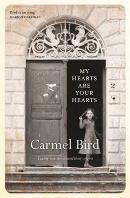 Family skeleton was also reviewed by Nalini Haynes (of Dark Matter Zine). She was a little challenged by it, but was positive overall saying that it would be good for bookclubs as it “will inspire discussion not only about the literary aspects of the novel but about families and secrets.” A book that is interesting on both literary and content levels is, I agree, perfect bookclub material.
Family skeleton was also reviewed by Nalini Haynes (of Dark Matter Zine). She was a little challenged by it, but was positive overall saying that it would be good for bookclubs as it “will inspire discussion not only about the literary aspects of the novel but about families and secrets.” A book that is interesting on both literary and content levels is, I agree, perfect bookclub material.
Now, this post is getting long, so I’ll just share Jennifer Cameron-Smith’s comments on Bird’s most recent short story collection, My hearts are your hearts. She, who also reviewed The essential Bird for the Challenge this year, says she has fallen in love with Bird’s short stories. Here’s what she says about My hearts are your hearts:
But each of the stories, entire in itself, could be different. Could be larger, perhaps, if Ms Bird chose to take it in another direction or into a different dimension. Each story is perfect as it is, but I felt like each story had another life, somewhere off the page, it could be continued. There’s a form of magic in the mundane, a believability in what is presented.
Tantalising, n’est-ce pas? But also, Cameron-Smith has captured that special something about Bird’s work, which is the difficulty of pinning her down. Just when you think you’ve grasped her point, she’s off on another tangent. It makes her such fun to read. Do try her if you haven’t.
The Triple-Reviewed Books
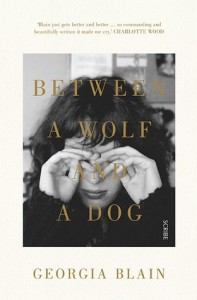 To conclude this month, we should focus on the two books which were reviewed thrice!
To conclude this month, we should focus on the two books which were reviewed thrice!
Georgia Blain’s intriguingly titled, and Queensland Literary Award winning Between a wolf and a dog was reviewed by Alex Daw, Carol (Reading, Writing and Riesling), and Weird Marginalia. Alex describes the plot:
Hilary, a filmmaker, is dying and wants to choose her own death. Her husband has predeceased her and her daughters, now grownup with their own issues, are loving towards her but estranged from each other.
She found it an easy read. She liked that Blain “keeps sentimentality at bay” and enjoyed the lyrical prose, though she didn’t much like the characters. This month’s top review, Carol, loved the book, saying it’s among the best she’s read this year. She writes:
Exquisitely painful, melancholy, reflective, poignant and yet so beautifully written you will not be able to put this book down.
Finally, Weird Marginalia, also loved it, reiterating some of the points made by our other two reviewers, and writing:
The characters are well drawn and believable. They live in a thoroughly realistic and credible world. It is easy to emphasise [empathise?] with their small dramas. The writing is lyrical … This is an engrossing read …
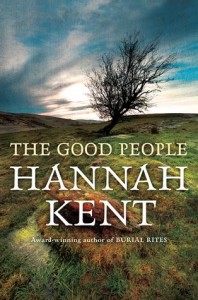 While Georgia Blain has written around 8 novels, The good people is Hannah Kent’s second. Like her hugely successful Burial rites, this novel looks at a crime in a different place and time to her own, this time early nineteenth century Ireland. It was reviewed this month by Emily Paull (Aka The Incredible Rambling Elimy), Julia Tulloh Harper, and Kate (booksaremyfavouriteandbest).
While Georgia Blain has written around 8 novels, The good people is Hannah Kent’s second. Like her hugely successful Burial rites, this novel looks at a crime in a different place and time to her own, this time early nineteenth century Ireland. It was reviewed this month by Emily Paull (Aka The Incredible Rambling Elimy), Julia Tulloh Harper, and Kate (booksaremyfavouriteandbest).
Emily Paull, who enjoyed it, though not quite as much as that hard-act-to-follow first novel, introduces the plot as follows:
The novel tells the story of three women who set about trying to banish a fairy changeling which they believe has been left in the place of one of the women’s grandson.
Sounds like Kent has unearthed another complex story about women in difficult times, doesn’t it?
All three reviewers praised Kent’s writing, particularly her ” evocative descriptions of the forest and the river and the mist” (Julia Tulloh Harper) and her “unbelievably beautiful” writing on landscape and nature (Kate). However, each didn’t engage with it as much as they had with Burial rites. It appears that Kent has written a beautiful second novel, with a fascinating plot, but has not engaged readers quite so much this time around. Those second novels are very tricky, particularly when your first had the success that Kent’s did. I think I need to read this one for myself.
I’ve mentioned only a few of the books reviewed this month. To see all books reviewed for the challenge, please check our books reviewed search page.
———————
About Me
I am Whispering Gums and I read, review and blog about (mostly) literary fiction. It was reading Jane Austen when I was 14 years old that turned me on to reading literary fiction/classics, which is why I am here today doing this round-up! Little did Jane know what she started!
My love of Aussie literature started with Banjo Paterson’s ballads and Ethel Turner’s Seven Little Australians in my childhood. But, I didn’t really discover Australian women’s writing until the 1980s when I “met” and fell in love with Elizabeth Jolley, Thea Astley, Olga Masters, Helen Garner and Kate Grenville. Ever since then I have been making sure to include a good percentage of Australian (and other) women writers in my reading diet.






Congrats on being the most prolific reviewer this month Carol 🙂
Thanks Tracey … nice of you!
Thanks for another great roundup, Sue. The PM Lit Awards were announced on Tuesday night with Lisa Gorton and Charlotte Wood sharing the prize for fiction. I missed all the excitement on the night, but saw the news in my Twitter feed yesterday morning. As Brona remarked, it was nearly a clean sweep of women winning the prizes across the genres. (I’ve now established a Google alert so I might pick up such news a bit sooner!)
Thanks Elizabeth. And yes, I saw that, and since it happened in November I’ll be writing that up in my November post. I need to read Lisa Gorton’s book … I hadn’t realised that John Gorton was (or, “is” he still, though he’s no longer with us?) her grandfather.
PS While I think of it…is there any reason to keep the name/email/blog fill ins to make comments here?
I find that I don’t leave comments on any blog that has these requirements when I’m reading blog posts on my phone as it’s too fiddly to fill in the sections, so I have to wait until I think to do it when on my PC. Which means the moment is usually long gone.
I have no idea, Brona. I don’t know how these things work. I almost never see that form because I’m usually signed into my WordPress Account, which means that it “knows” me and all I get is the comment block with “logged in as whisperinggums”. So, I don’t need to do anything other than type my comment. I certainly know what you mean about filling in those sections on a phone. I’d hate it. However, for me, if I do happen to see the form, I immediately do the wordpress login (under META in the sidebar where, as I recollect, I just click “login with wordpress”) and poof, the form goes and I just have the comment block.
What would you expect if you didn’t have to sign in to comment? Are you thinking you’d comment as Anon? Sorry for being obtuse, but I’m not sure what other options there are? If you can explain it more we could ask the person who manages the backend for us.
From What I can see, I am already signed in – at least I can comment on other WP blogs without having to fill in the ‘submit a comment’ section.
I could click on the meta sign in thing on the side of the page, but again that only works when I’m on the PC. When I’m on the phone (& logged in) to WP the comment form pops up each time to be filled in. For every comment.
Out of curiosity I signed in with the meta log in for this comment and the submit form is not there.
I guess I don’t understand why, even though I’m not logged out of WP, (because I was just commenting on another WP blog) I have to ‘log in’ to comment on here every single time?
I don’t know the behind the scenes mechanics of WP well enough to explore where this setting might be able to be tweeked?
There are only a few blogs I like to visit regularly where this happens, but it does mean having to wait until I have the time to do it on my PC to visit them.
Whereas on your own blog, the ‘your logged in as Brona’ message pops up as soon as I click on the reply box, whatever device I’m on & doesn’t require me to log in again. I can go from blog to blog & post to post and comment without having to log on each time.
I’m sorry Brona, I really can’t help. Maybe Elizabeth will pick this up. I can explain thought that my blog is the free wordpress.com service, whereas this one is a hosted wordpress.org one. It gives us more customisation flexibility – including the ability to maintain a single database of all the reviews which we couldn’t before – but some features are lost.
The whole commenting aspect of blogs is a mystery to me. I pretty much only know what I experience and not much about behind the scenes.
When I do the meta login here, which I need to do every so often (after the “remember me” option has timed out) I choose the LOG IN WITH WORDPRESS ACCOUNT option which always seems to know who I am, and I make sure I tick the “remember me” box. If I don’t tick the remember me box I have to log in every time. I think this is the same on my laptop as on my tablet.
PS I’m glad MY blog works better for you!!
I’ve been eyeing of Carmel Bird’s latest book at work, but have too many others vying for my attention right now, so I’m trying to be strong!
Great round up Sue.
I’ll mention the HMB PM winners in my post next week, but leave the rest for you to highlight at your leisure 🙂
Thanks Brona … yes, I know the feeling about many books vying.
And thanks for the heads-up re PM’s prize and HMB.